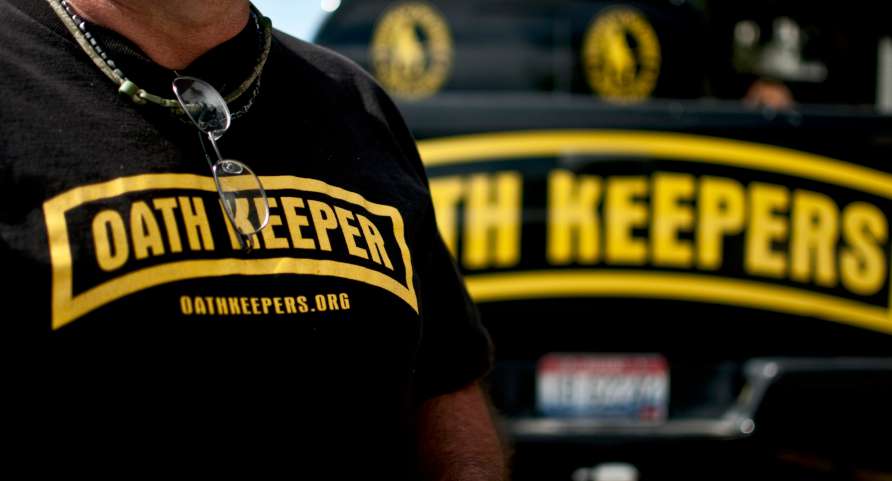Why did the Justice Department wait over a year to arrest Stewart Rhodes when nearly two dozen other Oath Keepers already have been charged with a conspiracy he orchestrated?
Facing intensifying criticism from Democratic lawmakers, journalists, and even some federal judges for not seeking harsher punishment against January 6 protesters, Attorney General Merrick Garland finally produced charges to appease his detractors. Last week, more than a year after the so-called insurrection, Garland charged 11 members of the Oath Keepers with seditious conspiracy.
The star of the new indictment, handed down by a grand jury on January 12, is Stewart Rhodes, the founder of the alleged militia group. (His co-defendants were charged with several other offenses months ago.)
Rhodes, described only as “person one” for nearly a year in numerous criminal indictments related to his organization, has been a free man since January 6, 2021, raising plausible suspicions that he may have been a government informant at the time. After all, the FBI has a longstanding pattern of infiltrating fringe groups such as the Oath Keepers and moving them to commit indictable crimes.
Under the definition of “seditious conspiracy,” prosecutors allege Rhodes and his co-defendants conspired to halt the “lawful transfer of presidential power by force” including not just the Electoral College certification but the inauguration, which was 14 days away.
The flagrantly political move will give the Justice Department a temporary reprieve from its loud chorus of critics on the Left. January 6 propagandists boast that the new charges finally offer some support to the heretofore baseless claim that the events of that day amounted to an “insurrection.” Beryl Howell, the chief judge of the D.C. court handling every January 6 case, recently expressed her dismay at the “petty offenses” sought by prosecutors; she undoubtedly will be thrilled with the news.
Corporate media also commend this apparently sweeping indictment. “It’s hard to underemphasize (sic) how significant this is,” former FBI official and MSNBC contributor Frank Figliuzzi told Nicolle Wallace after the indictment was announced. CNN legal analyst Asha Rangappa concluded that “even if Trump wasn’t directly involved in their ‘plan,’ his [exhortation] to his lunatic mob to head to the Capitol definitely helped them execute their operation.”
But the real question is whether the government can make the charges stick. As my book, January 6: How Democrats Used the Capitol Protest to Launch a War on Terror Against the Political Right, details, the case against the Oath Keepers is weak. Out of the 20 people tied to the Oath Keepers (three have accepted plea deals), only one is accused of assaulting or impeding a police officer. No Oath Keeper is charged with carrying or using a weapon; the only property charge is “aiding and abetting” the destruction of government property. None are charged with...
The star of the new indictment, handed down by a grand jury on January 12, is Stewart Rhodes, the founder of the alleged militia group. (His co-defendants were charged with several other offenses months ago.)
Rhodes, described only as “person one” for nearly a year in numerous criminal indictments related to his organization, has been a free man since January 6, 2021, raising plausible suspicions that he may have been a government informant at the time. After all, the FBI has a longstanding pattern of infiltrating fringe groups such as the Oath Keepers and moving them to commit indictable crimes.
Under the definition of “seditious conspiracy,” prosecutors allege Rhodes and his co-defendants conspired to halt the “lawful transfer of presidential power by force” including not just the Electoral College certification but the inauguration, which was 14 days away.
The flagrantly political move will give the Justice Department a temporary reprieve from its loud chorus of critics on the Left. January 6 propagandists boast that the new charges finally offer some support to the heretofore baseless claim that the events of that day amounted to an “insurrection.” Beryl Howell, the chief judge of the D.C. court handling every January 6 case, recently expressed her dismay at the “petty offenses” sought by prosecutors; she undoubtedly will be thrilled with the news.
Corporate media also commend this apparently sweeping indictment. “It’s hard to underemphasize (sic) how significant this is,” former FBI official and MSNBC contributor Frank Figliuzzi told Nicolle Wallace after the indictment was announced. CNN legal analyst Asha Rangappa concluded that “even if Trump wasn’t directly involved in their ‘plan,’ his [exhortation] to his lunatic mob to head to the Capitol definitely helped them execute their operation.”
But the real question is whether the government can make the charges stick. As my book, January 6: How Democrats Used the Capitol Protest to Launch a War on Terror Against the Political Right, details, the case against the Oath Keepers is weak. Out of the 20 people tied to the Oath Keepers (three have accepted plea deals), only one is accused of assaulting or impeding a police officer. No Oath Keeper is charged with carrying or using a weapon; the only property charge is “aiding and abetting” the destruction of government property. None are charged with...

































